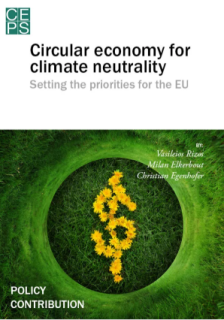
This Policy Brief from the Centre for European Policy Studies (CEPS) looks at how circular economy can support EU climate policy, emphasizing that circular economy is more than just another ‘product standards’ policy.
Main messages:
- There is a need for a framework that is able to systematically address trade-offs, such as between the circular and the bioeconomy, but also between material efficiency and energy use, as well as
- A mechanism to steer and monitor progress, touching upon the question of whether and if so, how to increase ambition and develop tools to monitor progress, for example via targets, and
- The new Commission will need to develop and then scale up successful products and processes to create opportunities for new value chains while addressing risks, such as dependency on raw materials.
The principal challenge is to be to create ‘lead markets’ for the circular economy in combination with low-carbon products. Many ideas for this exist. They include, for example, ‘carbon contracts for difference’, carbon budgets for projects, consumption charges, taxes and tax exemptions, sustainable finance, product standards and public procurement. Ideas now need to be tested to see whether they could work in practice.
Finally, EU circular economy will need to be underpinned by a robust and transparent carbon accounting system. If effective, such as system can at the same time act as a catalyst for investment in the circular economy and low-carbon products and processes.
